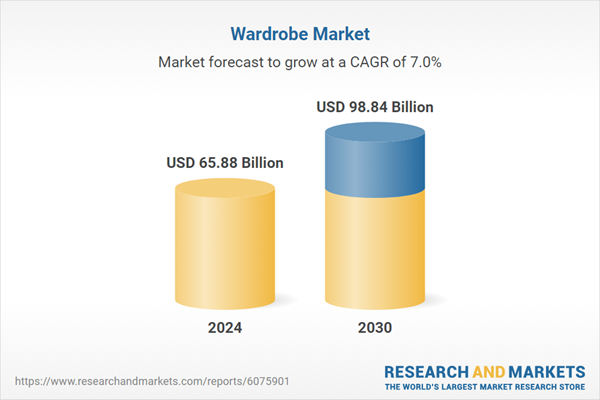Speak directly to the analyst to clarify any post sales queries you may have.
10% Free customizationThis report comes with 10% free customization, enabling you to add data that meets your specific business needs.
Key Market Drivers
Urbanization and Growing Residential Construction
A major growth driver of the global wardrobe market is the ongoing wave of urbanization and the resulting boom in residential construction. As populations increasingly shift toward urban centers in countries like India, China, Brazil, and regions of Africa, the demand for well-structured living arrangements is accelerating. Compact urban dwellings require efficient storage solutions, making modular and space-saving wardrobes highly desirable.In India, for example, the urban population in 2024 stands at 461 million and is growing steadily, with cities projected to generate the bulk of national income in the coming years. This urban trend is complemented by government initiatives promoting affordable housing, further spurring furniture demand. The modern wardrobe has evolved into a multifunctional fixture with sliding doors, customized interiors, and smart designs tailored for apartment living. As the number of residential projects grows globally, so too does the demand for innovative wardrobe solutions designed to optimize storage in limited spaces.
Key Market Challenges
Volatile Raw Material Prices and Supply Chain Disruptions
The global wardrobe market faces a persistent challenge in the form of fluctuating raw material prices and disrupted supply chains. Key materials such as wood, MDF, metal, and glass are subject to cost variations influenced by global economic trends, trade disputes, and environmental policies. Events like the COVID-19 pandemic and the Russia-Ukraine conflict have significantly impacted logistics and material availability, leading to delays and cost increases in manufacturing.Shipping costs remain elevated, while regulatory restrictions on timber usage add further complexity for producers relying on traditional materials. These factors disproportionately affect small and mid-sized manufacturers who may lack the capacity to absorb cost increases or secure consistent supply sources. Additionally, growing emphasis on sustainable materials, while important, often leads to higher production costs. The combination of pricing instability and logistical uncertainty continues to strain profit margins and complicates operations across the industry.
Key Market Trends
Rise of Modular and Customizable Wardrobes
A key trend shaping the global wardrobe market is the increasing preference for modular and customizable wardrobe systems. Urban consumers, especially in compact apartments, are prioritizing space-efficient solutions that can be tailored to their individual needs. Modular wardrobes allow flexibility in design, enabling users to select compartment configurations, finishes, door types, and additional features like built-in mirrors or workstations. This trend is particularly popular among younger demographics and modern families who value both personalization and functionality.Retailers and manufacturers are responding with digital configurators that allow customers to design wardrobes online or in showrooms, supporting the demand for bespoke solutions. Additionally, the popularity of minimalist and open-plan interiors has driven interest in sleek, integrated wardrobe designs. Multi-functional wardrobes that combine storage with additional uses - such as dressing tables or fold-out desks - are also gaining traction. This personalization trend enhances customer satisfaction and encourages brand loyalty by addressing diverse consumer needs across global markets.
Key Market Players
- Oppein Home Group
- California Closets
- Mobilspazio Srl
- hülsta-werke Hüls GmbH & Co. KG
- Closets by Design, Inc.
- Closet Factory
- Molteni&C S.p.A
- Lema s.p.a
- Würfel
- Spacewood
Report Scope:
In this report, the Global Wardrobe Market has been segmented into the following categories, in addition to the industry trends which have also been detailed below:Wardrobe Market, By Material:
- Wood
- Metal
- Glass
- Others
Wardrobe Market, By Distribution Channel:
- Online
- Offline
Wardrobe Market, By Region:
- North America
- United States
- Canada
- Mexico
- Europe
- France
- United Kingdom
- Italy
- Germany
- Spain
- Asia-Pacific
- China
- Japan
- India
- South Korea
- Vietnam
- South America
- Argentina
- Colombia
- Brazil
- Middle East & Africa
- South Africa
- Saudi Arabia
- UAE
- Turkey
Competitive Landscape
Company Profiles: Detailed analysis of the major companies present in the Global Wardrobe Market.Available Customizations:
With the given market data, the publisher offers customizations according to a company's specific needs. The following customization options are available for the report.Company Information
- Detailed analysis and profiling of additional market players (up to five).
This product will be delivered within 1-3 business days.
Table of Contents
Companies Mentioned
- Oppein Home Group
- California Closets
- Mobilspazio Srl
- hülsta-werke Hüls GmbH & Co. KG
- Closets by Design, Inc.
- Closet Factory
- Molteni&C S.p.A
- Lema s.p.a
- Würfel
- Spacewood
Table Information
| Report Attribute | Details |
|---|---|
| No. of Pages | 184 |
| Published | April 2025 |
| Forecast Period | 2024 - 2030 |
| Estimated Market Value ( USD | $ 65.88 Billion |
| Forecasted Market Value ( USD | $ 98.84 Billion |
| Compound Annual Growth Rate | 6.9% |
| Regions Covered | Global |
| No. of Companies Mentioned | 10 |









